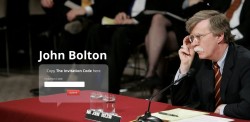
Much to my surprise a few days ago, I received an invitation from Ambassador John Bolton to hook up with him on LinkedIn.
While I have expressed admiration for as well as concerns about the public service that Ambassador Bolton has done for the country, many of his colleagues and perhaps he don't hold me in the highest regard for the role that The Washington Notehttp://www.thewashingtonnote.com played during his confirmation battle when he was nominated to serve as US Ambassador to the United Nations. For the record, while I disagree with many of John Bolton's views, I do think that he did a global public service in supporting the Proliferation Security Initiative and I think he enriches the debate on foreign policy and major choices this country faces. I've long wanted to do a panel or interview with him, bury any leftover hatchets, and have a mature, thoughtful talk on his view of the world.
When I got the LinkedIn invite, I held out hope that maybe that time had come.
I captured a screen grab of the invite at the time because I figured that somewhere along the way, one of the Ambassador's foreign policy colleagues might blow the whistle and I'd be expelled from his LinkedIn roster as fast I was invited in. I read the "profile" of Bolton -- and it read something along the lines of "I have strong views on US foreign policy. Served as US Ambassador to the United Nations. Am sometimes called a neoconservative though I don't accept the term. I supported the Vietnam War."
I should have known at the time that this was an odd self-depiction, but it was close enough that I figured it could be real -- and told some colleagues at The Atlantic about how he had described himself, particularly the reference to neoconservatism and Vietnam.
The note about neoconservatives was a smart one as Bolton really is not a neocon. He's more of a strident nationalist. In fact, one of the best lines I ever heard about the differences between conservatives and neoconservatives was made in the presence of the legendary Jeanne Kirkpatrick at the Nixon Center by defense policy hand Dov Zakheim who declared proudly "I am not a neoconservative because I was never a liberal." I always figured that the same adage applied to John Bolton.
Whoever was writing this descriptive text about Bolton was not uninformed.
Despite a little doubt, I clicked yes -- and figured I let some time pass before seeing if the Ambassador might want to do a public affairs program together or something. Could be interesting and fun.
Then this morning, I received this note from AmbJohnBolton@gmail.com:
Hello Mr. Clemons
This is Christine Samuelian, the Especial Assistant at John Bolton's.
The message sent to you is an invitation to Mr. Bolton's newly established web site.
Please, provide your email in a reply message here to issue you the invitation link.
Thanks in advance!
Because we have a great tech worrywart at The Atlantic who is on the constant prowl for groups like the Syrian Electronic Army who are trying to topple journalists and their publications for writing unpleasant things about Bashar al-Assad, I figured this might be phishing. We have double controls on our email accounts that prevent us (so far) from making mistakes that go too far down the phishing hole. Nonetheless, I gave the group an email address -- also with double code controls -- just in case this really was John Bolton reaching out. I knew that Christine Samuelian really was Bolton's assistant -- though I suspected her English abilities were better than the email suggested.
Then I got an invitation code to join Ambassador Bolton's website, pictured above. Clicking in the invitation code took me to the dual access code restrictions for my email -- thus preempting the hackers who have hijacked John Bolton's identity from getting further into my system.
The hackers then sent me this note:
Hello Mr. Clemons
This is Christine Samuelian, the Especial Assistant at John Bolton's.
Please give us your opinion, if you have received and checked the invitation code
Thanks in advance!
I immediately let John Bolton's staff know what was up -- that someone had put together a somewhat sophisticated play to get other national security and foreign policy practitioners to share their information. There was no request for financial information.
These criminals seem to want access to databases, emails, names and phone numbers.
So I remain hopeful that I will one day be able to have a great and robust exchange with John Bolton about US foreign policy and the challenges the nation faces -- but the lesson here is that if you get a note from Ambassador John Bolton reaching out, beware. Might be hackers.